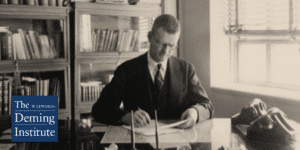Bill Bellows
Post by Bill Bellows, Deputy Director, The Deming Institute. In the spirit of standardization that is growing in popularity in organizations around the world, is there room for diversity? That is, is variety really the spice of life, or does it represent a non-value added effort, if not simply waste? In other words, should variation always be […]
Read MorePost by Bill Bellows, Deputy Director, The Deming Institute. A few decades before The Big Bang Theory introduced television audiences to fictional theoretical physicist Sheldon Cooper, with guest appearances by Stephen Hawking, astronomer Carl Sagan was one of the most well-known non-fictional US physicists. Amongst Sagan’s research interests was the search for extra-terrestrial intelligence, including the odds […]
Read MoreThis guest post is an excerpt from Ed Baker’s book (pages 140-141), The Symphony of Profound Knowledge, which was created in partnership with Aileron.org. Dr. Tom Johnson, an economist and self-described “recovering management accountant,” is well known for his early contributions to the traditional accounting profession. His books Relevance Lost, coauthored with Robert S. Kaplan, and Relevance […]
Read MorePost by Bill Bellows, Deputy Director, The Deming Institute. Midway through graduate school, while employed through the summer months in an engineering position, I joined fellow interns in an after-hours outing at a local pub. With our internships coming to an end, we invited our department manager to join us. Unlike the technical questions we answered all […]
Read MorePost by Bill Bellows, Deputy Director, The Deming Institute. Once upon a time, well before his name entered lean folklore, Taiichi Ohno graduated from industrial school and earned a position with Toyoda Spinning & Weaving as a supervisor. The year was 1933 and Ohno soon became well known for his mustache, added to further his image of […]
Read MorePost by Bill Bellows, Deputy Director, The Deming Institute. As noted in my June 26th post, “It Depends…”, when asked in February 1990 about the trend towards reducing the number of levels of management in organizations, Dr. Deming answered, in his usual Socratic fashion: “Why have more levels than you need?” Now, consider what Socratic questions might […]
Read MoreGuest post by Lori Fry, Principal with Navigator Management Partners, originally featured as a post at https://dignityatworkproject.com/. Follow this link to listen to our first podcast with Lori. Monitoring employees’ time in the restroom is not okay. If you believe monitoring employees’ time in the restroom will materially improve your company’s bottom line, refer to […]
Read MorePost by Bill Bellows, Deputy Director, The Deming Institute. On a summer weekend in 1997, I visited my office for a short time before heading home after a few errands near work. At the time, I was a member of the company’s Continuous Improvement Team, a later version of a Total Quality Management Office. Upon dropping in, […]
Read MorePost by Bill Bellows, Deputy Director, The Deming Institute. Sparky Anderson, manager of the Cincinnati Reds during most of the 1970s, spoke on occasion about the big problem he had with his Major League Baseball team. He claimed that the Reds, also known at the time as “The Big Red Machine,” had so much talent that he […]
Read MorePost by Bill Bellows, Deputy Director, The Deming Institute. “There is not a day I don’t think about what Dr. Deming meant to us. Deming is the core of our management,” proclaimed Shoichiro Toyoda, Toyota’s president between 1982 and 1992 and chairman between 1992 and 1999, at the 1980 Deming Prize Ceremonies in Japan. One year earlier, […]
Read More


